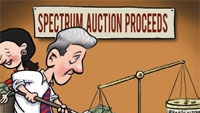Broadcasters take the heat
The professional video industry's #1 source for news, trends and product and tech information. Sign up below.
You are now subscribed
Your newsletter sign-up was successful

Sens. John Kerry, D-MA, and Olympia Snowe, R-ME, have concocted a plan designed to punish broadcasters for doing what TV stations have done well for 70 years: broadcast.
Snowe referred to the nation's RF situation as a “spectrum crisis, maybe; spectrum reform, absolutely.” She continued, “Also, several studies have observed low-spectrum occupancy rates or usage. So if spectrum isn't being used 100 percent of the time, it isn't a crisis; we just need more effective management.” Translated: We need more government control.
Kerry droned on with similar bias, “Our nation's competitiveness, economic growth and national security demand that we allocate the necessary attention to current policy shortcomings, and enactment of this vital legislation will help avert the looming spectrum crisis and allow us to continue to enjoy the boundless benefits of spectrum-based services.”
While their proposed bill, the Spectrum Measurement and Policy Reform Act, is characterized as merely the required regulatory infrastructure to conduct a spectrum inventory, the legislation goes far beyond just counting users and megahertz. It also establishes spectrum auction awards and permits the FCC to levy licensee fees that broadcasters are sure to find burdensome. In addition, the bill ensures that absolutely none of any spectrum auction proceeds will ever be deposited into the U.S. Treasury — as promised.
The Kerry/Snowe bill first demands $10 million in new funding over two years. For that, we get little more than a spreadsheet inventory listing users and spectrum in addition to another bureaucratic committee. The legislation also sets a 12-month timetable to establish four 120MHz channels for each of the following applications: sharing, reuse, temporary or dynamic short-term assignment and spectrum layering. These are in addition to the coming reduction of broadcast space. By year two, the NTIA and FCC must establish “pilot programs” within those channels.
Several aspects of the pending bill should concern broadcasters. First, the bill gives the FCC total freedom to determine what broadcasters might receive for voluntarily relinquishing their spectrum. Second, the bill sets forth two requirements the FCC must use when setting annual broadcaster licensee fees: “fair market commercial value” and “the public interest of the service the spectrum is being used for.”
Interestingly, federal spectrum user license fees are based only on “fair market commercial value.” In other words, only TV stations may be determined to be inefficient users of “public” spectrum, therefore requiring punishment in the form of high licensee fees.
The professional video industry's #1 source for news, trends and product and tech information. Sign up below.
Finally, the act would require that 30 percent of broadcast license fees go to maintaining what is called the Spectrum Relocation and Efficiency Fund, which is an account available exclusively to federal users. Currently, after eight years, any unspent money from this account is returned to the general fund of the U.S. Treasury. Under this bill, the money stays in the slush fund for 20 years. What are the odds of there being any money left after two decades?
This bill represents another piece of the administration's plan to penalize TV station owners who choose to remain in business, instead of getting out of the way of the Genachowski-Obama National Broadband Plan bus. If they hope to remain in business, broadcasters will need to be highly involved with their representatives and associations as this legislation moves forward.
For more information about the Spectrum Measurement and Policy Reform Act, turn to this month's FCC Update column, on page 18.
Send comments to: editor@broadcastengineering.com
